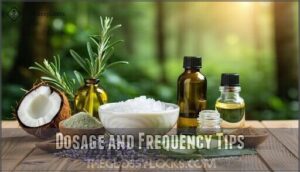This site is supported by our readers. We may earn a commission, at no cost to you, if you purchase through links.

Aloe vera soothes irritation and delivers lasting hydration to damaged scalp cells. Apple cider vinegar restores pH balance and gently exfoliates flaky buildup.
These natural remedies for dry scalp work by addressing root causes like dehydration and inflammation rather than masking symptoms. The secret lies in combining complementary ingredients and applying them with the right frequency and technique for your specific scalp condition, using ingredients like aloe vera and coconut oil’s lauric acid to achieve lasting results with natural remedies.
Table Of Contents
- Key Takeaways
- Causes and Triggers of Dry Scalp
- Best Natural Remedies for Dry Scalp
- How to Use Natural Remedies Safely
- Lifestyle and Diet Tips for Scalp Health
- When to Seek Professional Help
- Frequently Asked Questions (FAQs)
- What is the best natural remedy for dry scalp?
- How do I get rid of dry scalp asap?
- How do you rehydrate a dry scalp?
- What can I use for extremely dry scalp?
- What foods help improve dry scalp?
- How does stress affect scalp health?
- Can diet changes alleviate dry scalp?
- Is dry scalp linked to hair loss?
- How does climate impact scalp moisture?
- Can dry scalp cause permanent hair loss?
- Conclusion
Key Takeaways
- You’ll get the best results by combining coconut oil’s moisture-locking lauric acid with tea tree oil‘s anti-inflammatory properties—this duo tackles both dryness and irritation effectively.
- Don’t overwash your hair, as daily shampooing strips natural oils and worsens dryness; stick to 2-3 times weekly and use lukewarm water instead of hot.
- Apple cider vinegar rinses restore your scalp’s pH balance and remove buildup, but you’ll need to dilute it properly (1:3 ratio with water) to avoid irritation.
- You can tell if it’s dry scalp versus dandruff by checking the flakes—dry scalp produces small, white, powdery flakes while dandruff creates larger, yellowish, oily ones.
Causes and Triggers of Dry Scalp
Before you get frustrated with that itchy, flaky scalp, it’s important to understand what’s actually causing the problem in the first place.
Identifying the root triggers—whether it’s your shampoo, the weather, or something else entirely—can save you time and help you choose the most effective natural treatment.
Weather and Environmental Factors
During winter months, cold air exposure can reduce your scalp’s moisture retention by up to 25%, creating those pesky white flakes. Low humidity below 40% accelerates water loss from scalp cells, while forced indoor heating compounds dry air impact. Temperature fluctuations between cold outdoors and heated indoors intensify dryness.
Climate change brings extreme weather patterns that disrupt your scalp’s natural moisture balance, making natural remedies increasingly essential for maintaining scalp health year-round, and this is due to the scalp’s natural moisture balance.
Harsh Hair Care Products
Your haircare products might be sabotaging your scalp health. Sulfates in shampoos strip natural oils, causing dryness and scalp irritation. Chemical damage from hair dye risks and harsh product ingredients creates inflammation.
Consider shampoo alternatives like sulfate-free formulas to protect your haircare routine. Many commercial haircare products contain alcohols and fragrances that worsen scalp health, making your scalp feel tight and flaky, which can be addressed by using shampoo alternatives and avoiding products with harsh ingredients, thus opting for a haircare routine that prioritizes scalp health.
Overwashing and Dehydration
Your hair follicles act like sponges—overwashing strips away natural oils, disrupting scalp moisture balance. Daily shampooing can trigger dehydration causes that worsen hair porosity, making your dry scalp more susceptible to irritation.
The overwashing effects create a vicious cycle where your scalp overproduces oil to compensate. For effective dryness prevention and dry scalp treatment, limit washing to 2-3 times weekly using coconut oil between washes to maintain healthy scalp moisture levels.
Underlying Health Conditions
Several medical conditions can trigger persistent scalp dryness. Autoimmune disorders like scalp psoriasis create inflamed, scaly patches that mimic severe dandruff. Seborrheic dermatitis causes chronic skin inflammation from abnormal yeast responses. Eczema triggers extend to scalp areas, especially in people with family histories.
Thyroid disorders reduce natural oil production, while diabetes impairs skin hydration. These skin conditions often require medical evaluation alongside dry scalp treatment approaches. Understanding scalp health conditions is essential for effective treatment and management of dry scalp symptoms.
Dandruff Vs. Dry Scalp
Many people confuse dandruff with dry scalp, but they’re actually different scalp conditions requiring distinct treatments. Dandruff stems from Malassezia, a yeast-like fungus that thrives in oily environments, while dry scalp results from insufficient moisture and skin irritation affecting hair follicles and scalp ecology.
Here’s how to tell them apart:
- Flake appearance: Dandruff produces larger, yellowish, oily flakes; dry scalp creates smaller, white, powdery flakes
- Scalp feel: Dandruff occurs on oily scalps; dry scalp feels tight and parched
- Itching patterns: Dandruff causes persistent itching; dry scalp itching worsens in cold, dry weather
- Hair condition: Dandruff often accompanies greasy hair; dry scalp pairs with brittle, dry strands
- Treatment response: Antifungal shampoos help dandruff; moisturizing treatments work better for dry scalp
Understanding this distinction helps you choose effective natural remedies for dry scalp instead of targeting fungal infections unnecessarily. Proper diagnosis of dandruff vs dry scalp is essential for effective management and prevention of these conditions.
Best Natural Remedies for Dry Scalp
When your scalp feels tight and itchy, natural remedies can provide gentle relief without harsh chemicals.
These time-tested treatments work by moisturizing dry skin, reducing inflammation, and restoring your scalp’s natural balance.
Coconut Oil Moisturizing
Coconut oil stands as your scalp’s best friend when dryness strikes. Rich in lauric acid, this natural moisturizer penetrates hair shafts while creating a protective barrier that locks in hydration.
Coconut oil’s lauric acid creates nature’s perfect moisture shield for thirsty scalps
You’ll want to warm a few tablespoons, massage gently into your scalp, and leave overnight for maximum moisture absorption before washing out. Using a good coconut oil moisturizer product can enhance these benefits.
Tea Tree Oil for Itchy Scalp
For those battling itchy scalp alongside dryness, tea tree oil offers powerful natural anti-dandruff benefits. Clinical studies show 5% tea tree oil reduces dandruff severity by 41% while providing itchy scalp relief.
Mix 3-5 drops with coconut or jojoba oil for effective scalp massage techniques. The active compound terpinen-4-ol fights fungal overgrowth and inflammation. Always patch test first, as undiluted application can irritate sensitive skin.
To learn more about treating dandruff, consider using tea tree oil for its therapeutic properties.
Aloe Vera for Inflammation
Aloe vera’s cooling properties make it your scalp’s best friend when inflammation strikes.
The gel contains compounds that calm irritated skin while delivering deep moisture to combat dry scalp symptoms.
You can apply fresh aloe gel directly or mix vera extract with carrier oils for enhanced benefits.
This natural remedy reduces itchiness and provides anti-irritation relief without harsh chemicals, utilizing the cooling properties of aloe vera to soothe the scalp.
Apple Cider Vinegar Rinse
Apple cider vinegar’s antimicrobial properties restore your scalp’s natural pH balance while gently exfoliating dead skin cells. This powerful rinse tackles dry scalp by removing product buildup and reducing inflammation naturally.
How to use ACV for dry scalp treatment:
- Mix proper dilution – Combine 1 part apple cider vinegar with 3 parts water to prevent irritation
- Apply after shampooing – Pour mixture over damp hair, focusing on scalp areas
- Rinse frequency – Use once weekly initially, adjusting based on your scalp’s response
Olive and Jojoba Oil Treatments
When apple cider vinegar falls short, olive oil and jojoba oil deliver deeper moisture. These natural home remedies for dry scalp penetrate hair shafts, providing lasting hydration.
Jojoba oil mimics human sebum, offering anti-inflammatory benefits through gentle scalp massage. Olive oil masks create protective barriers while nourishing follicles. You can find a variety of products for this purpose.
Mix one tablespoon of each for ideal hair nourishment and barrier repair.
Banana and Avocado Hair Masks
While oils provide deep nourishment, banana and avocado masks offer water-soluble vitamins and minerals that penetrate differently. These nutrient-rich fruits contain natural emollients and vitamins that restore scalp moisture while providing gentle exfoliation for improved dry scalp treatment effectiveness.
Transform your scalp with nature’s moisturizers:
- Bananas contain potassium and natural oils for instant hydration
- Avocado oil penetrates deeply with omega-3 fatty acids
- Combined ingredients create synergy for enhanced absorption
- Simple home remedies deliver salon-quality results
Basic Recipe: Mash one ripe banana with two tablespoons avocado oil. Apply using gentle circular motions for ideal application techniques. Leave mask for 20 minutes before rinsing. For recipe variations, add honey for antibacterial benefits or yogurt for additional exfoliation. The ingredient synergy between banana’s natural conditioners and avocado’s healthy fats creates powerful mask benefits, making this banana hair conditioner effective for addressing stubborn dryness through natural scalp remedies.
How to Use Natural Remedies Safely
While natural remedies can work wonders for dry scalp, you’ll want to use them correctly to avoid irritation or allergic reactions.
Proper dilution ratios, patch testing, and following safe application techniques guarantee these treatments help heal your scalp rather than harm it.
Essential and Carrier Oil Combinations
Mixing different oils creates powerful synergy benefits for dry scalp treatment. Tea tree oil paired with coconut oil offers antimicrobial action plus deep moisturizing, while olive oil enhances scalp absorption of active compounds.
Many users find tea tree oil effective for scalp health. Always conduct sensitivity testing before applying DIY blends—mix 2-3 drops essential oil per tablespoon carrier oil. Proper oil ratios prevent irritation while maximizing therapeutic effects for natural scalp remedies, ensuring dry scalp treatment and promoting scalp health.
Dosage and Frequency Tips
Proper dosage guarantees maximum benefits without scalp irritation. Start with minimal amounts and gradually increase frequency based on your skin’s tolerance. Remember, more isn’t always better when treating dry scalp conditions.
- Begin conservatively: Use 2-3 drops of tea tree oil mixed with 1 tablespoon coconut oil twice weekly
- Monitor tolerance: Apply aloe vera or jojoba oil daily, reducing to every other day if irritation occurs
- Limit acidic treatments: Use apple cider vinegar rinses once weekly maximum to prevent over-drying
DIY Mask and Treatment Recipes
Creating effective DIY scalp treatments requires combining complementary ingredients that address dryness without causing irritation. These simple recipes transform kitchen staples into therapeutic treatments.
| Treatment Type | Key Ingredients | Application Method |
|---|---|---|
| Coconut Oil Base | Coconut oil + tea tree oil (2 drops per tablespoon) | Massage into scalp, leave 30 minutes |
| Aloe Vera Soother | Fresh aloe vera + apple cider vinegar (1:1 ratio) | Apply to damp scalp, rinse after 20 minutes |
| Avocado Mask | Mashed avocado + coconut oil + honey | Cover scalp completely, wrap in towel 45 minutes |
| Banana Treatment | Ripe banana + olive oil + lemon juice | Blend smooth, apply generously, rinse thoroughly |
| ACV Rinse | Apple cider vinegar + water (1:3 ratio) + tea tree oil | Final rinse after shampooing, don’t rinse out |
Many ingredients, such as shea butter benefits, can also improve skin health. Always patch-test new combinations before full application to prevent adverse reactions.
Lifestyle and Diet Tips for Scalp Health
Your scalp’s health depends on what you eat and drink just as much as the products you apply.
Smart lifestyle choices and proper hair care habits can prevent dry scalp issues before they start, making your natural remedies even more effective.
Hydration and Nutrition Essentials
Your scalp’s health depends heavily on what you put into your body. Dehydration reduces natural oil production, while vitamin deficiencies can worsen dry scalp symptoms. Supporting your scalp microbiome through dietary changes enhances the effectiveness of home remedies like coconut oil and olive oil for scalp moisturizing.
Key nutrients for ideal hydration levels and scalp health:
- Omega-3 fatty acids – Found in salmon, walnuts, and flaxseed oil to reduce inflammation
- Adequate water intake – 2-2.5 liters daily supports cellular regeneration and moisture retention
- Antioxidant-rich foods – Berries and leafy greens protect against environmental damage
- Essential minerals – Zinc and iron from eggs and spinach improve cell turnover
Washing Frequency and Water Temperature
Finding the right washing habits can make or break your dry scalp recovery. Hot water strips natural oils, while lukewarm temperatures preserve moisture without irritating inflamed skin.
Water hardness affects product residue buildup, requiring seasonal adjustments to frequency. Over-washing triggers more dryness, so most people benefit from washing every 2-3 days, letting natural home remedies for dry scalp work between sessions, which is crucial for maintaining the balance and avoiding dryness.
Protective Styling and Headwear
Your choice of headwear materials can make or break your scalp’s health journey. Cotton and bamboo fabrics breathe better than synthetic materials, preventing sweat buildup that aggravates dry scalp conditions. Loose-fitting styles reduce hairstyle tension while silk-lined caps offer night protection.
When applying home remedies like coconut oil or tea tree oil, avoid tight headwear that blocks product application and circulation. One way to achieve this is through beginner-friendly crochet braids. Your scalp’s health journey can be significantly improved by choosing the right scalp’s health journey and using loose-fitting styles.
Avoiding Irritants and Product Build-Up
Your hair care routine might be sabotaging your scalp without you realizing it. Heavy silicones, sulfates, and artificial fragrances create stubborn residue that clogs follicles and triggers irritation.
Switch to gentle cleansing products and use clarifying treatments weekly for effective residue removal. Regular scalp exfoliation with home remedies like apple cider vinegar helps maintain tool hygiene and prevents build-up that worsens dry scalp conditions.
When to Seek Professional Help
While natural remedies work for many people, they’re not always enough for persistent dry scalp conditions. If your symptoms haven’t improved after two weeks of consistent home treatment, or if you’re experiencing hair loss, bleeding, or signs of infection, it’s time to consult a dermatologist for professional evaluation and treatment.
Persistent or Severe Dry Scalp
When home remedies consistently fail after two weeks of treatment failure, it’s time to wave the white flag. Persistent itchy scalp, worsening symptoms, or new concerns warrant professional evaluation.
Dermatologists can distinguish between simple dryness and complex conditions requiring prescription treatments beyond tea tree oil or apple cider vinegar solutions. Underlying conditions like seborrheic dermatitis require expert care.
Signs of Infection or Hair Loss
Watch for red flags that signal your dry scalp has crossed into infection territory. Scalp sores, pus formation, and increased itch intensity beyond normal discomfort warrant immediate attention.
Bald patches or hair thinning in specific areas indicate follicle damage that home remedies can’t address. When haircare products stop providing relief and itchiness worsens despite consistent treatment, bacterial or fungal invasion may be compromising your hair loss prevention efforts.
Ineffective Home Treatments
Sometimes your best efforts just aren’t cutting it, and that’s when you need to recognize the warning signs. When worsening symptoms persist despite consistent home remedies for dry scalp, or if you’re experiencing allergic reactions to tea tree oil or apple cider vinegar treatments, it’s time to pause.
- Product buildup from multiple DIY treatments can actually worsen itchy scalp conditions
- Delayed treatment of underlying conditions like eczema or psoriasis requires medical intervention
- Persistent inflammation after two weeks suggests your scalp needs professional assessment, especially for conditions like eczema or psoriasis that require medical intervention
Special Considerations for Babies and Sensitive Skin
When caring for babies with cradle cap or eczema concerns, you’ll need gentler approaches than standard home remedies. Baby shampoo with gentle ingredients works better than tea tree oil, which can irritate delicate skin.
Before trying coconut oil or aloe vera, conduct allergy testing on a small patch. Harsh treatments can worsen infant dry scalp conditions, so consult your pediatrician first.
Frequently Asked Questions (FAQs)
What is the best natural remedy for dry scalp?
Coconut oil acts like nature’s healing balm for your parched scalp. You’ll find this versatile remedy moisturizes deeply while fighting fungal infections that worsen dryness, making it clinically proven and widely accessible.
How do I get rid of dry scalp asap?
Apply coconut oil or aloe vera gel directly to your scalp, massage gently, and leave for 20 minutes before washing. Use lukewarm water and limit washing frequency to prevent further drying.
How do you rehydrate a dry scalp?
Like a desert thirsting for rain, your scalp craves moisture restoration. You’ll rehydrate effectively by applying natural oils like coconut or jojoba, using lukewarm water when washing, drinking plenty of fluids, and choosing gentle, sulfate-free shampoos that won’t strip essential moisture.
What can I use for extremely dry scalp?
For severely dry scalp, you’ll need intensive moisture therapy. Try coconut oil overnight treatments, gentle medicated shampoos with salicylic acid, or prescription corticosteroids if home remedies don’t work within two weeks.
What foods help improve dry scalp?
You’ll want to focus on omega-3 rich foods like salmon and walnuts, plus zinc sources including pumpkin seeds.
Vitamins A, B, and C from leafy greens support healthy scalp function while staying hydrated helps maintain moisture, including zinc sources.
How does stress affect scalp health?
Ever notice your scalp itching more when life feels like a pressure cooker? Stress triggers inflammation and hormone shifts, making your scalp dry, flaky, and irritated.
Managing stress helps keep your scalp’s natural balance in check, and reduces the impact of stress.
Can diet changes alleviate dry scalp?
Yes, you can improve dry scalp through diet changes. Consuming Omega-3 fatty acids, zinc, and vitamins A, B, and C supports scalp health from within.
Stay hydrated while limiting caffeine and alcohol to maintain natural moisture levels and support scalp health.
Is dry scalp linked to hair loss?
When your scalp’s natural balance gets disrupted, it can create a domino effect leading to hair thinning.
Persistent scratching from dry, itchy scalp causes inflammation and trauma to hair follicles, potentially resulting in temporary hair loss that resolves with proper treatment, which can be related to hair thinning.
How does climate impact scalp moisture?
Cold, dry air strips your scalp’s natural oils, while hot weather increases oil production but can dehydrate skin.
Indoor heating and air conditioning create moisture-zapping environments that leave your scalp feeling tight and flaky, related to the issue that hot weather can cause.
Can dry scalp cause permanent hair loss?
Maria noticed clumps of hair in her shower drain after months of scratching her itchy scalp.
While dry scalp can cause temporary hair loss from scratching and inflammation, it won’t cause permanent damage if you address it properly.
Maria’s situation illustrates that temporary hair loss can occur due to this condition, but proper care prevents long-term issues.
Conclusion
Apparently, your scalp thinks it’s living in the Sahara Desert while you’re just trying to survive Monday morning meetings.
These natural remedies for dry scalp don’t require a chemistry degree or breaking the bank—just common sense and pantry staples. Coconut oil, tea tree oil, and aloe vera provide scientifically-backed relief when applied consistently. Remember: patience beats panic when treating scalp conditions naturally.
- https://my.clevelandclinic.org/health/diseases/22828-scalp-psoriasis
- https://pmc.ncbi.nlm.nih.gov/articles/PMC10015649/
- https://www.mayoclinic.org/diseases-conditions/sjogrens-syndrome/symptoms-causes/syc-20353216
- https://www.masterpiecehospital.com/en/hair-transplant/2547/
- https://www.altitudedermatology.com/blog-post/flaky-scalp-dandruff-vs-medical-condition














